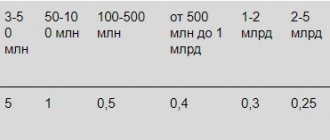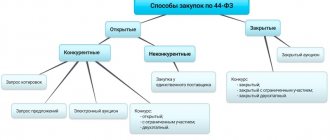Letter of the Federal Antimonopoly Service No. IA/100041/19 dated November 14, 2019 on the fragmentation of government procurement
A new approach to the issue of fragmentation of purchases
FAS published letter No. IA/100041/19 dated November 14, 2019, in which it talked about splitting a large order into several small ones. The department recalled that for small purchases there are restrictions only on the contract price and annual volume. The limit on the purchase of goods of the same name is prescribed in 94-FZ, which has become invalid. Currently there is no such rule in the legislation.
Therefore, the department believes that the repeated acquisition of goods, works, services of the same name from a single supplier in itself in compliance with the requirements established by clauses 4, 5, part 1 of Art. 93 44-FZ, does not violate the requirements of contract legislation. For example, the conclusion of three contracts dated October 25, 2019 for the supply of A4 paper with a single supplier in the amount of 290,000 rubles each. The main thing is that such actions are not the result of an anti-competitive agreement. In Art. 16 of Federal Law No. 135-FZ of July 26, 2006 on the protection of competition indicates which actions lead to the prevention, restriction, or elimination of competition and are regarded as an anti-competitive agreement.
When is procurement allowed?
Purchasing from a single supplier is possible at the initiative of the customer, who enters into an agreement with a specific supplier after an offer to conclude a deal has been sent to him or after the customer has received an offer from the supplier to conclude a contract and subsequently accepted it.
The Law “On the procurement of goods, works, services by certain types of legal entities” dated 223-FZ of 2011 does not regulate direct procurement from a single supplier, but divides all procurement into competitive and non-competitive. 223-FZ obliges customers to identify suppliers through an auction and competition, but purchasing from a single supplier is not necessary.
For procurement using a non-competitive method, the customer must specify this method of determining the supplier in the Procurement Regulations. This Regulation also defines the regulations for the preparation and implementation of the procurement procedure.
223-FZ does not provide grounds for purchasing from a single supplier. The customer must specify them in the Procurement Regulations developed by him. But when choosing such grounds, you need to take into account only those reasons when the use of competitive procurement becomes impossible or impractical. It is the Procurement Regulations that are the fundamental document that regulates the customer’s work under 223-FZ. This is due to the fact that 223-FZ does not regulate the issue of procurement as strictly as compared to 44-FZ.
When choosing the grounds for purchasing from a single supplier, the customer can (but is not obliged) to rely on the provisions of 44-FZ. The grounds for conducting non-competitive procurement within the framework of the contract system are listed in Art. 93 44-FZ. Within the framework of 223-FZ, customers can expand this list.
Abuse of this right to conduct non-competitive procurement by the customer can lead to negative consequences. The customer must give priority to competitive methods of selecting a supplier (for example, according to Letters of the Ministry of Economic Development of 2015 No. D28i-3384, of 2015 No. D28i-3118, etc.). The Ministry of Economic Development indicates that the unreasonable use of procurement from a single supplier leads to limited competition, inefficient spending of funds and can be appealed.
Concluding a contract with a single supplier has certain advantages for both the supplier and the customer. Under such a scheme, the supplier is guaranteed to receive a contract, does not have to spend financial and time resources on preparing an application for participation in the procurement, and the customer receives a reliable and trusted supplier to fulfill the contract and supply the goods, works and services he needs. The risks of violation of the contract execution process will be minimal.
The scheme of signing a contract with a single supplier has certain disadvantages. The main one is the lack of competition. This entails a minimal price reduction and does not meet the principles of saving money.
FAS in its letter referred to judicial practice with similar conclusions about fragmentation.
We collected them in a table.
| decision of the Stavropol Regional Court dated May 23, 2018 in case No. 7-339/2018 |
| decision of the Vladimir Regional Court dated 03/02/2018 in case No. 11-39/2018 |
| decision of the Smolensk Regional Court dated June 18, 2017 in case No. 21-236/2017 |
| decision of the Supreme Court of the Altai Republic dated 06/05/2014 in case No. 21-35/2014 |
Despite the FAS’s explanations, we recommend splitting up purchases consciously. If you purchase homogeneous and identical items in a short period of time through direct contracts, and not in the form of a competitive procedure, courts and control authorities still perceive such actions as an artificial fragmentation of procurement.
The FAS noted that liability for artificial fragmentation of procurement under 44-FZ clearly threatens if you carry out several small procurements for construction work based on one design documentation or one section of such documentation. In this case, the customer’s actions do not comply with the requirements of 44-FZ and are qualified as a violation of 135-FZ.
Which supplier identification method should you choose?
Neither 44-FZ nor 223-FZ contain the concept of “fragmentation of procurement”. The customer chooses a method for determining the winner: both competitive (auctions, tenders, requests for quotations in electronic form, etc.) and non-competitive (agreement with a single supplier).
Bidding is not always a more efficient and effective way to order than a single supplier. There is a reduction in time costs (for an electronic tender, auction, publication of a notice - 7-20 days, a moratorium on the period of concluding a contract, for example, no earlier than 10 days from the date of determining the winner), confidence in the presence of a contender (there are tenders during which they do not submit not a single application), etc.
All cases of a contract with a single supplier are reflected in Art. 93 of the law on the contract system, and the most commonly used method is concluding a contract for an amount not exceeding 300,000 rubles. (clause 4, part 1, article 93, for certain types of educational and cultural organizations - according to clause 5, part 1, article 93 - up to 600,000 rubles). According to 223-FZ, cases of a contract with a single supplier are not strictly regulated and are indicated in the procurement regulations.
The customer comes to the conclusion that it is advisable to split a large purchase into small ones and conclude separate contracts with the supplier for one object, which means fragmentation.
On procurement from a single supplier in light of changes to Law No. 223-FZ
V. A. Leksina author of the article, legal consultant to Askon
From July 1, 2021, changes made to the Federal Law of July 18, 2011 N 223-FZ “On the procurement of goods, works, services by certain types of legal entities” (hereinafter referred to as Law N 223-FZ) began to take effect in accordance with the Federal Law of December 31. .2017 N 505-FZ “On Amendments to Certain Legislative Acts of the Russian Federation” (hereinafter referred to as Law N 505-FZ).
According to Law No. 505-FZ, customers must bring their existing procurement regulations into compliance with the standards introduced by them in Law No. 223-FZ and post the updated regulations in the Unified Information Network (UIS) before January 1, 2021.
As the Ministry of Finance of Russia explained in Information Letter dated June 25, 2018 N 24-06-08/43650 “On the entry into force of the provisions of Federal Laws dated December 31, 2017 N 504-FZ and N 505-FZ”, customers from July 1, 2021 and until 1 January 2021 has the right to make purchases according to the rules established in the procurement regulations as amended, in force until it is brought into compliance with Law N 223-FZ as amended by Law N 505-FZ.
However, by January 1, 2021, it is necessary that the procurement regulations take into account all changes to Law No. 223-FZ. Otherwise, customers will have to make purchases according to the rules of Federal Law dated 04/05/2013 N 44-FZ (as amended on 08/03/2018) “On the contract system in the field of procurement of goods, works, services to meet state and municipal needs,” which is much stricter regulates their actions during procurement rather than Law No. 223-FZ. In this regard, it is advisable for customers to still work on their current provisions, especially since time still allows for this.
Previously, we covered all the changes made by Law N 505-FZ to Law N 223-FZ, and drew attention to the new edition of Part 2 of Art. 3 of Law N 223-FZ, according to which the procurement regulations must now provide for competitive and non-competitive procurement methods. In this article we will talk in a little more detail about purchases that can only be made from a single source, that is, about such a non-competitive procurement method as purchasing from a single supplier (performer, contractor).
As stated in Part 3.2 of Article 3 of Law No. 223-FZ, a non-competitive procurement is a procurement the conditions for which do not comply with the conditions provided for in Part 3 of this article. Methods of non-competitive procurement, including procurement from a single supplier (performer, contractor), are established by the procurement regulations.
The peculiarity of non-competitive procurement is that it takes place much faster and contains fewer stages, but the use of this procurement method must be justified, since, according to Law N 223-FZ, procurement from a single supplier is based on the impossibility of choosing a different, competitive procurement method. In this regard, based on the new requirements in force from July 1, 2021, namely Art. 3.6 of Law N 223-FZ, in the procurement regulations it is necessary to establish a procedure and an exhaustive list of cases of procurement from a single supplier, contractor, performer. If the customer makes a purchase not in accordance with the regulations approved by him, this may be considered a violation of Art. 3.6 of Law N 223-FZ, and the concluded agreement was declared invalid by the court.
As a general rule, the corresponding purchase must be provided for in the procurement plan (Part 5.1, Article 3 of Law No. 223-F). Carrying out a purchase not provided for in the procurement plan will result in the customer being held liable in the form of a fine.
When carrying out such purchases, the customer, as a general rule, is still obliged to prepare a document justifying the fact that carrying out the purchase in any other way is inappropriate. However, the customer has the right not to place information about the purchase from a single supplier in the Unified Information System, since Law N 223-FZ does not oblige him to prepare such documents during such a purchase, such as, for example, a notice, documentation, draft contract, unless the customer himself has provided otherwise in procurement regulations
The conclusion of an agreement with a single supplier is carried out either by drawing up an agreement that includes all the conditions specified in the law, or, when the purchase is carried out in an amount of up to 100 thousand rubles, by sending an application to the supplier (contractor) and payment by the customer of the invoice. This simplified form of concluding a contract for the named type of procurement is legal and complies with the requirements of the Civil Code of the Russian Federation and Law N 223-FZ. For example, the customer has the right to enter into small transactions for cash and subsequently draw up advance reports, while the execution of the transaction occurs at the time of its completion. In such cases, the written form of the agreement by virtue of clause 3 of Art. 438 of the Civil Code of the Russian Federation will be considered complied with, and the agreement will be considered concluded.
After concluding an agreement, the customer is obliged, within 3 working days, to enter the established information and documents on the conclusion of this agreement into the register of agreements maintained in the Unified Information System by the Federal Treasury. But there is an exception to this rule, according to which the register of contracts may not include information about contracts concluded for an amount not exceeding 100 thousand rubles and 500 thousand rubles. for customers with annual revenue for the reporting financial year of more than 5 billion rubles.
From 07/01/2018 in accordance with Part 19 of Art. 4 of Law N 223-FZ, customers must place monthly reports in the UIS, before the 10th day of the month following the reporting month, containing information on all concluded contracts and separately information on contracts concluded with a single supplier.
Data should include:
- information on the number and total cost of contracts concluded by the customer based on the results of the purchase of goods, works, services, including the total cost of contracts, information about which is not included in the register of contracts;
- information on the number and cost of contracts concluded by the customer based on the results of procurement from a single supplier (performer, contractor);
- information on the number and cost of contracts concluded by the customer with a single supplier (performer, contractor) based on the results of a competitive procurement recognized as failed.
Information on the quantity and cost of contracts with a single supplier (performer, contractor) must be posted by all customers making purchases under Law N 223-FZ. The report includes information about contracts concluded with a single supplier during the reporting month, regardless of the basis for such purchase. The report also provides data on those transactions whose value is no more than 100 thousand rubles. (no more than 500 thousand rubles for customers with annual revenue for the reporting financial year of more than 5 billion rubles), even when, when making such purchases, information about them is not posted in the Unified Information System.
Requirement of Part 19 of Art. 4 of Law N 223-FZ also applies to transactions concluded with a single supplier without drawing up a single document called an “agreement”. The date of conclusion and execution of such an agreement, as follows from the above, is the date of payment of the invoice issued by such a supplier (performer).
In conclusion, I would like to note that when drawing up procurement regulations, customers are not recommended to give priority to procurement from a single supplier compared to competitive procurement methods. This position is adhered to by the Russian Ministry of Economic Development, pointing out that abuse of the right to purchase from a single supplier can lead to restriction of competition.
Reasons for fragmentation of purchases
Let us highlight the following reasons and factors for the disaggregation of government orders:
- The need for expedited delivery of goods and completion of work. As often happens, deadlines are simply running out and a specific result is required by a certain date. For example, the supply of New Year's gifts for the needs of an educational organization in the amount of 500,000 rubles. No later than December 31, students must receive gifts, and the customer, who has not organized the auction procedure in advance, decides to conclude two contracts for an amount of no more than 400,000 rubles. everyone in order to have a successful New Year's holiday.
- Reluctance to draw up a full package of documents for the competitive procedure: the only supplier does not require the publication of notices and documentation. For example, carrying out repair work in a medical organization in the amount of 200,000 rubles. It is easier to conclude two contracts for no more than 100,000 rubles than to draw up and publish documentation containing design estimates in the Unified Information System.
- The presence of benefits from so-called “kickbacks” for providing a state or municipal order to a specific applicant. For example, the supply of medical equipment in the amount of 500,000 rubles. The customer does not hold an auction, but gives the implementation of this state contract to a specific person by concluding five contracts for an amount of no more than 100,000 rubles, receiving a certain remuneration on behalf of the contractor.
Justification for purchase
Reports on all contracts with a single supplier under 223-FZ must be published no later than the 10th day of the month following the reporting month on the basis of Part 19 of Art. 4 223-FZ, section 8 of Government Decree No. 908 of 2012. This report contains information about all purchases with a single supplier, signed with the participation of the customer, regardless of the contract amount. This report provides information on the amount of signed contracts, while there is no need to justify the choice of a non-competitive form of procurement from the customer.
If a contract in a non-competitive form is signed with SMP, then information about it is also included in the reporting on purchases from small businesses.
A sample justification for purchasing from a single supplier under 223-FZ can be viewed here.
Justification for purchasing from a single supplier is not required if the customer has not included a different condition in the Regulations. When receiving a request from the regulatory authority, the customer should explain the reasons for choosing a non-competitive form of procurement, preferably with reference to the current Procurement Regulations.
Responsibility for splitting purchases
You should not think that splitting a single purchase into a group of homogeneous ones, the amount for each of which does not exceed the maximum value established by individual provisions of the law, does not entail liability. Consider the rules:
- Budget legislation, art. 34 of the Budget Code. Fragmentation is recognized by regulatory authorities as a violation of the principle of effectiveness and efficiency in the use of budget funds.
- Civil legislation, art. 170 of the Civil Code. Fragmentation involves the creation of sham transactions that are carried out in order to cover up a single large order. According to Part 2 of Art. 170 of the Civil Code, sham transactions are void (invalid).
- Law on Protection of Competition, art. 15 of Law No. 135 of July 26, 2006. The principle of ensuring competition must be observed; an unreasonable reduction in the number of participants is not allowed.
Liability for violation when choosing a method for determining the supplier under Part 2 of Art. 7.29 of the Code of Administrative Offenses entails the imposition of an administrative fine in the amount of 50,000 rubles, prevention of competition, according to 14.32 of the Code of Administrative Offenses - a similar fine or disqualification. Responsibility for fragmentation of procurement under 223-FZ threatens for actions that limit competition. In Part 1 of Art. 3 223-FZ states that it is necessary to be guided by the principles of equality, fairness, non-discrimination and unreasonable restrictions on competition in relation to participants.
Cherdantseva Tatyana



